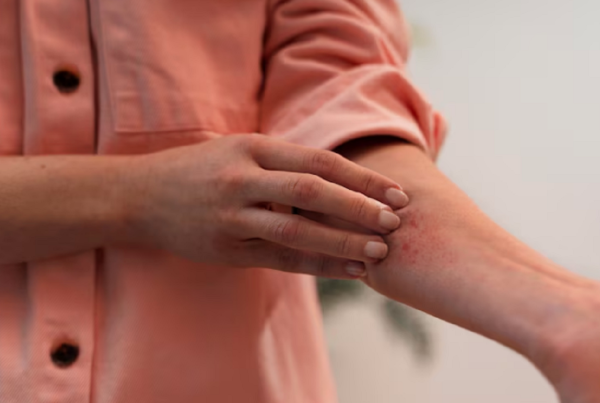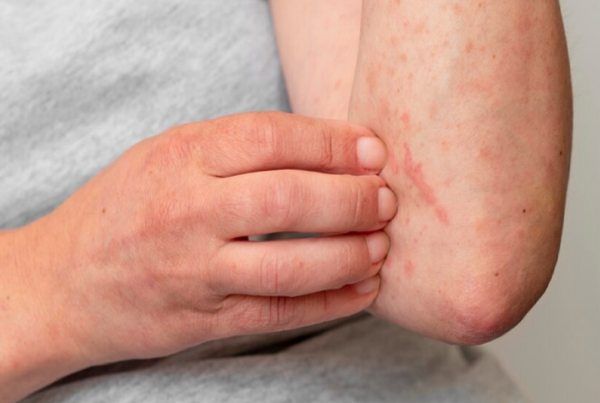
The monsoon comes as a shower of relief from the scorching heat of summer. The first rain that quenches the thirst of the earth not only brings the pleasant smell of the soil but also fills the atmosphere with a cool breeze and freshness. Greenery spreads all around, and trees and plants come alive again. But with this soothing weather, skin problems also quietly knock at the door. The humidity and stickiness of the rainy season cause excessive sweating, which can lead to skin infection in monsoon, skin rashes & allergies, fungal infections, and other skin issues such as ACNE.
Does your skin also feel the same as soon as the rainy season comes? If your answer is ‘yes’, then you are not alone. For millions of people, monsoon does not mean just romance and relief, but it also carries multiple skin problems. This season brings with it extreme humidity that gives bacteria and fungi a golden opportunity to flourish. Different types of fungal infections, red rashes, and acne spoil all the fun of this beautiful season.
But not anymore! You do not need to hate the monsoon for the sake of your skin. In this blog, we will tell you how you can take proper care of your skin and enjoy the rain to the fullest without any worries.
Monsoon and Your Skin: Why is This Season a Challenge?
The level of humidity in the atmosphere increases a lot during the monsoon. This increased moisture disturbs the natural balance of the skin. Our skin either becomes too oily or excessively dry in some parts. This humid environment provides an ideal environment for bacteria and fungi to thrive, which is the biggest threat to skin health. In the monsoon season, sweat does not dry easily, due to which the pores get clogged and dirt starts accumulating. This is the reason why there is a sudden surge in skin problems in this season. If you are troubled by itching in rainy season, then understand that this is just the beginning. If proper care is not taken, this problem can take a serious form and can affect the health of your skin for a long time. Therefore, it is important to understand why special skin care is necessary in this season.
Here’re Some Common Skin Problems in Monsoon
The rainy season, as pleasant as it seems, can be equally challenging for the skin. Here are some skin common problems that people often face.
- Fungal Infections
Fungal infection in monsoon is one of the most common skin problems. Due to moisture and sweat, fungus spreads rapidly in parts of the body such as between the fingers, underarms, around the waist, and thighs. Ringworm and athlete’s foot are common types. In this, red, round rashes form on the skin, which cause severe itching. Wearing wet clothes or shoes for a long time increases this problem even more. An effective monsoon fungal infection treatment starts with hygiene. Always keep your skin dry and wear loose cotton clothes. If the infection occurs, consult a dermatologist immediately, as it spreads very fast, and ignoring it can be costly.
- Bacterial Infections
Getting drenched in rainwater or passing through waterlogged areas can make you prone to bacterial infections. The bacteria present in dirty water can enter the body through small cuts or wounds on the skin. Folliculitis, in which the hair follicles become inflamed and filled with pus, is a common example. Apart from this, serious infections like impetigo and cellulitis can also occur. To avoid a serious skin infection in monsoon, it is important to always bathe with clean water and use antiseptic soap after getting drenched in the rain. Keep your feet especially clean and dry, as they are the first to come in contact with dirty water. Including these small things in your skin care routine can save you from many big problems.
- Acne and Breakouts
The humidity of the monsoon makes the skin extra oily. This excess oil, sweat, and dirt together clog the pores, which increases the problem of acne. Frequent touching of the face in this season also spreads bacteria and causes breakouts. If you already have oily or acne-prone skin, then you need to be extra careful in the monsoon. It is beneficial to wash the face at least two to three times a day with a gentle, medicated cleanser. Also, avoid heavy and oily makeup products. Knowing how to treat body itching in rainy season is not limited to the body; it is also necessary to soothe facial itching and irritation with the right products, otherwise it can aggravate acne.
- Skin Allergies and Rashes
The increased humidity in the air also increases the airborne allergens such as pollen and mold. This can trigger an allergic reaction in people with sensitive skin. This can cause redness, itching and small rashes on the skin, which we commonly call hives. Apart from this, the blockage of sweat glands also causes prickly heat, which causes extreme itching and irritation. To prevent a serious skin allergy in monsoon, keep your skin as cool and dry as possible. Using a soothing cream like calamine lotion can help reduce irritation, but if the problem persists, seeking expert advice is the best option.
Monsoon Skincare Routine For Healthy Skin
After understanding the problems, let’s talk about the solutions now. By adopting a disciplined skincare routine, you can protect your skin from all these problems.
- Cleanliness is the first step
Skin cleanliness is most important during the monsoon. Clean your face and body at least twice a day with a good, gentle, and anti-bacterial cleanser. This will help remove excess oil, dirt, and bacteria accumulated on the skin. If you have got drenched in the rain, take a bath with lukewarm water as soon as you come home. Adding a few drops of antiseptic liquid to the bath water is a great remedy. It protects you from many types of infections and reduces the chances of getting rashes in the rain to a great extent. This habit of keeping the skin clean will act as a protective shield for you in the monsoon.
- Exfoliation is Important
Along with cleansing, it is also important to exfoliate the skin once or twice a week. Exfoliation helps remove dead skin cells, which can clog pores. This makes the skin look clean and glowing. You can use a mild scrub or even apply an ubtan made of gram flour, turmeric, and milk at home. However, be careful not to use a very harsh scrub, as it can irritate the skin and remove natural oils. A good exfoliation routine also helps you avoid fungal infections in the monsoon, as it keeps the skin surface clean where fungus can thrive.
- Maintain Skin’s Balance with Toning
After cleansing, use a toner to balance the pH level of the skin and close open pores. Always choose an alcohol-free toner, as alcohol can dry out the skin. Rose water is a great natural toner that you can use this season. It refreshes and soothes the skin. This simple step of toning goes a long way in keeping your skin healthy and preventing breakouts. When you think of a comprehensive skin infection prevention strategy in monsoon, maintaining the pH balance of the skin is an important part that is often overlooked.
- Don’t Forget to Moisturize
One mistake people often make is to skip applying moisturizer in humid weather. This is a big mistake. The humidity may make the skin feel oily, but it still needs hydration. Not applying moisturizer dehydrates the skin, causing the oil glands to produce even more oil. So, use a light, gel-based or water-based, non-comedogenic (which does not clog pores) moisturizer this season. It will keep the skin hydrated and will not make it greasy. It is also an essential body itching in rainy season treatment, as dry skin is more prone to itching, and a good moisturizer prevents this by retaining the skin’s moisture.
- Sunscreen is a Must in Every Season
Don’t think that you don’t need sunscreen just because the sun is hiding behind the clouds. The sun’s harmful UV rays can penetrate the clouds and reach your skin, and damage it. This can lead to sunburn, tanning, and premature ageing. Therefore, always apply a broad-spectrum sunscreen with at least SPF 30 before stepping out of the house. A gel-based or matte finish sunscreen is a good choice for this season. It protects the skin as well as prevents it from getting sticky. An uncontrolled skin allergy in the monsoon can sometimes get worse with sun exposure, so a layer of sunscreen adds an extra layer of protection.
Some Additional Tips To Maintain Healthy Skin in Monsoon
Apart from skincare routine, you can make your skin even better by taking care of some other things.
- Choice of Clothes Matter
Avoid wearing synthetic, nylon or polyester clothes in this season. These clothes do not absorb sweat and do not allow the skin to breathe, which increases the risk of infection. Always wear loose, clean and dry cotton clothes. Change wet clothes immediately.
- Take Special Care of Your Feet
The risk of fungal infection in the feet is highest in the monsoon. Always keep your feet clean and dry. Wear open slippers or sandals instead of closed shoes. If it is necessary to wear shoes, then remove them after coming home and wash and dry the feet thoroughly. Using antifungal powder is a good way to prevent itching and infection in the rain.
- Healthy Diet and Hydration
The health of your skin also depends on your diet. Avoid eating too much fried and spicy food as it can aggravate acne. Include vitamin C-rich fruits and vegetables like oranges, lemons, amla and green vegetables in your diet. This boosts your immunity and keeps the skin healthy. Drink plenty of water throughout the day to flush out toxins from the body.
- Home Remedies
You should use natural antiseptics like neem and turmeric. Adding neem water to bath water or applying turmeric paste can be beneficial for the skin. Aloe vera gel is a great remedy to soothe rashes and irritation in the rains. However, do a patch test before using any home remedy.
Conclusion
Monsoon is undoubtedly a beautiful and enjoyable season. However, you do not need to compromise on your skin to enjoy this season to the fullest. With just a little awareness, the right care and a disciplined routine, you can keep these common skin problems at bay. Remember, prevention is always better than cure. Understand your skin’s needs and give it the care it needs this season. By cleansing, choosing the right products and adopting a healthy lifestyle, you can ensure that your skin stays as fresh and glowing as the season itself. Love your skin and welcome this monsoon with open arms and a healthy, glowing skin. If monsoon skin problems are bothering you and home remedies are not providing relief, don’t wait any longer. Give your skin the expert care it deserves at Dr. Haror’s Wellness. Book an appointment today and enjoy this season without any worries.





